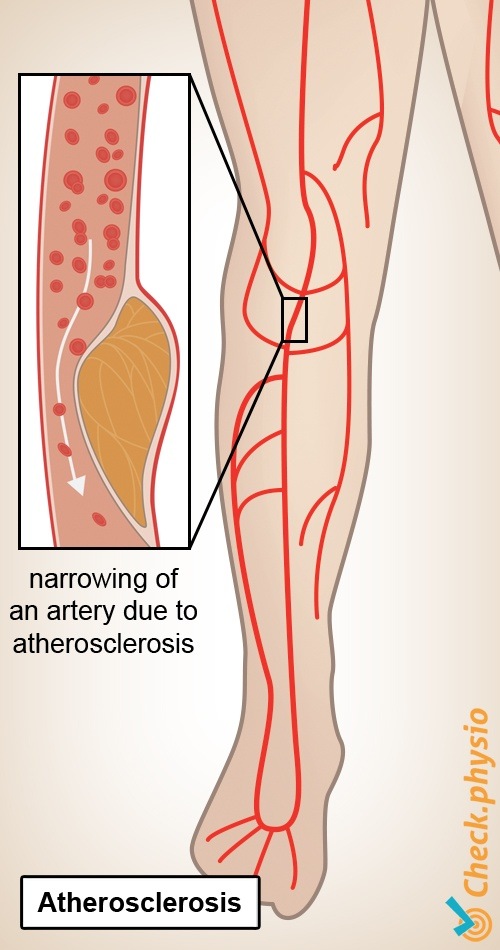A nurse is caring for a client who has peripheral arterial disease (PAD). Which of the following symptoms should the nurse expect to find in the early stage of the disease?
Dependent rubor
Intermitent claudication
Foot ulcers
Rest pain
The Correct Answer is B
The correct answer is B
Choice B reason: Intermittent claudication
Intermittent claudication is a characteristic symptom of PAD in the early stage, due to the reduced blood flow to the muscles during exercise. It is a cramping pain in the legs that occurs with walking and is relieved by rest.
Choice A reason: Dependent rubor is a sign of PAD in the advanced stage, due to the impaired vasodilation and reactive hyperemia. It is a reddish color of the lower extremities that occurs when they are lowered and disappears when they are elevated.
Choice C reason: Foot ulcers are a complication of PAD in the late stage, due to the poor wound healing and tissue necrosis. They are usually located on the toes, heels, or pressure points.
Choice D reason: Rest pain is another sign of PAD in the late stage, due to the severe ischemia and nerve damage. It is a persistent pain in the feet or toes that occurs at night and is not relieved by rest.

Nursing Test Bank
Naxlex Comprehensive Predictor Exams
Related Questions
Correct Answer is A
Explanation
The nurse should instruct the client to adjust the thermostat so that the environment is warm because cold temperatures can cause vasoconstriction and worsen the symptoms of PAD, such as pain, numbness, and poor wound healing. The client should also avoid exposure to cold weather and wear warm clothing.
- Apply a heating pad on a low setting to help relieve leg pain is wrong because it can cause burns, vasodilation, and increased blood flow to the legs, which can increase the risk of bleeding and edema in PAD.
- Wear antiembolic stockings during the day is wrong because they can impair arterial circulation and cause ischemia and tissue damage in PAD. Antiembolic stockings are used to prevent venous thromboembolism, not arterial disease.
Rest with the legs above heart level is wrong because it can decrease arterial blood flow to the legs and worsen ischemia and pain in PAD. The client should rest with the legs at or below heart level to promote arterial circulation.
Correct Answer is C
Explanation
Impaired tissue perfusion is a nursing diagnosis that indicates a decrease in oxygen and nutrient delivery to the tissues, resulting in cellular dysfunction and potential tissue damage or necrosis. It is the priority nursing diagnosis for a client who has varicose veins with ulcerations and lower extremity edema, as these are signs of chronic venous insufficiency, which is a condition in which the veins in the legs fail to return blood to the heart effectively, causing blood to pool and stagnate in the lower extremities. This leads to increased venous pressure, inflammation, and impaired wound healing, which can cause skin breakdown, infection, and tissue necrosis. The nurse should monitor the client's vital signs, peripheral pulses, capillary refill, skin color, temperature, and sensation, and implement interventions to improve venous return and prevent further complications, such as elevating the legs, applying compression stockings, encouraging ambulation, administering medications, and providing wound care.
Alteration in body image. This is a nursing diagnosis that indicates a negative perception or dissatisfaction with one's physical appearance or function. It may be applicable for a client who has varicose veins with ulcerations and lower extremity edema, as these may affect their self-esteem and social interactions. However, it is not the priority nursing diagnosis for this client, as it does not pose an immediate threat to their health or safety.
Alteration in activity tolerance. This is a nursing diagnosis that indicates a decrease in the ability to perform physical activities without experiencing fatigue, dyspnea, or other symptoms. It may be applicable for a client who has varicose veins with ulcerations and lower extremity edema, as these may limit their mobility and endurance. However, it is not the priority nursing diagnosis for this client, as it does not pose an immediate threat to their health or safety.
Impaired skin integrity. This is a nursing diagnosis that indicates a disruption or damage to the epidermis or dermis layers of the skin. It is applicable for a client who has varicose veins with ulcerations and lower extremity edema, as these can cause skin breakdown and infection. However, it is not the priority nursing diagnosis for this client, as it is a consequence of impaired tissue perfusion, which is the underlying problem that needs to be addressed first.
Whether you are a student looking to ace your exams or a practicing nurse seeking to enhance your expertise , our nursing education contents will empower you with the confidence and competence to make a difference in the lives of patients and become a respected leader in the healthcare field.
Visit Naxlex, invest in your future and unlock endless possibilities with our unparalleled nursing education contents today
Report Wrong Answer on the Current Question
Do you disagree with the answer? If yes, what is your expected answer? Explain.
Kindly be descriptive with the issue you are facing.
